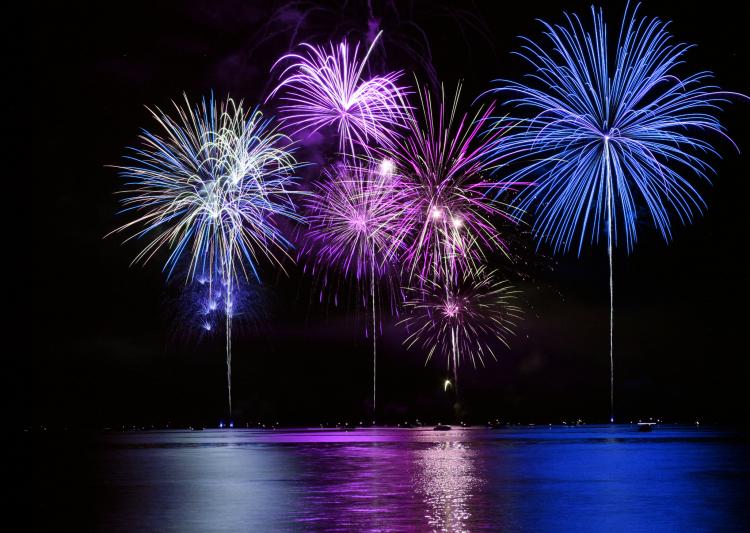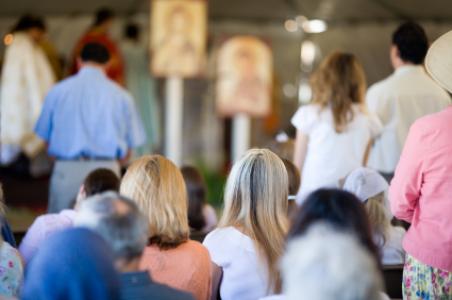
Do You Get a Black Moon?
What is a Black Moon, and why does it happen in December?
January 1 is the first day of the year, according to the Gregorian Calendar. Traditions in the Netherlands at this time of year include eating deep-fried dough balls known as oliebollen, watching fireworks and diving into the North Sea, lakes or canals.
Dutch employees are not legally entitled to a day off on public holidays. Schools, offices, businesses, and stores may be closed or open.

Fireworks are a popular way to mark the New Year in the Netherlands.
©iStockphoto.com/scampdesigns
In the period between December 26 and 31, many people and companies send New Year's cards to wish the recipient a good luck and fortune in the New Year. On the evening of December 31, may people hold or attend parties to celebrate the end of the past year and to welcome the New Year. In some towns and cities, public parties are held or public bonfires to burn Christmas trees are lit. At midnight, people kiss each other and wish one another "the best wishes for the new year" and may hold a toast with champagne or sparkling wine. In addition, many people and some organizations let off fireworks to mark the start of the New Year.
Many people spend the rest of January 1 quietly, often in the company of family or close friends. Some go hiking or cycling in the countryside and others organize a New Year's reception or meal. In a number of towns and villages, New Year's Dives are organized. Participants dive into the North Sea, lakes or canals and swim a small distance. These events are televised and the participants are seen as heroic given that it is cold in the Netherlands on January 1. In some areas, communal events are organized to clear up the litter that results from the fireworks set off at midnight.
Many employers give some extra money to their employees on or around January 1 and hold a New Year's reception in the first full week of the year. Many people receive the money with their wages for December. However, cleaners and people who deliver newspapers go around from door-to-door at this time of the year to request a tip for their services in the past year.
In the Netherlands, public life is very quiet on January 1. Post offices, banks, and many businesses are closed and only a few people work on this day. Public transport services run on reduced timetables or do not run at all. Very little congestion is expected on the roads.
In the Netherlands, the tradition of holding feasts and lighting special fires in the darkest part of the winter goes back many thousands of years. These are reflected in the festive and luxury meals served at this time of year and the fireworks and bonfires lit on the evening of December 31 and early hours of January 1.
There is also a long tradition of eating foods, which contain a lot of oil or fat, such as oliebollen and appelflappen. The tradition of eating foods containing a lot of fat may go back to the time of the pre-Christian Germanic goddess Perchta (Bertha). People believed that Perchta would fly across the sky with evil spirits in the darkest part of winter and try to cut open the stomachs of anybody she met. However, her knife would slide off the people who had been eating fatty foods.
The most common New Year's Day symbol in the Netherlands are the fireworks that are traditionally set off at midnight between December 31 and January 1. In large towns and cities, fireworks are set off continuously for one to two hours. This results in a smog that can take many hours to clear and leaves a layer of red paper snippets and other debris on the streets.
Other New Year's Day symbols are the special types of sweet dough eaten. These include: oliebollen (oil balls - a kind of spherical donut) made with or without raisins and served with icing sugar; appelflappen (small deep-fried pies filled with apple); duivenkater (a loaf of bread flavored with butter and lemon rind); waffles; knijpertjes (flat biscuits cooked in a waffle iron); and spekdikken (a kind of small pancake with pieces of bacon or dried sausage baked in it).
| Year | Weekday | Date | Name | Holiday Type |
|---|---|---|---|---|
| 2019 | Tue | Jan 1 | New Year's Day | Public Holiday |
| 2020 | Wed | Jan 1 | New Year's Day | Public Holiday |
| 2021 | Fri | Jan 1 | New Year's Day | Public Holiday |
| 2022 | Sat | Jan 1 | New Year's Day | Public Holiday |
| 2023 | Sun | Jan 1 | New Year's Day | Public Holiday |
| 2024 | Mon | Jan 1 | New Year's Day | Public Holiday |
| 2025 | Wed | Jan 1 | New Year's Day | Public Holiday |
| 2026 | Thu | Jan 1 | New Year's Day | Public Holiday |
| 2027 | Fri | Jan 1 | New Year's Day | Public Holiday |
| 2028 | Sat | Jan 1 | New Year's Day | Public Holiday |
| 2029 | Mon | Jan 1 | New Year's Day | Public Holiday |
While we diligently research and update our holiday dates, some of the information in the table above may be preliminary. If you find an error, please let us know.

What is a Black Moon, and why does it happen in December?

Why do mornings keep getting darker after the December solstice?

When will the next comet be visible?

The second day of Christmas is a holiday for many people in the Netherlands. It always falls on December 26.